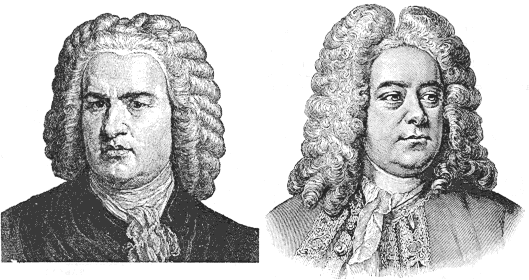Bach and Handel
Today, an odd connection between Bach and Handel. The University of Houston's College of Engineering presents this series about the machines that make our civilization run, and the people whose ingenuity created them.
A question recently sent me off into an unexpected technological byroad. Since Bach and Handel were born the same year, 1685, I wondered if they'd ever met.
In fact, they were born only about 80 miles apart -- Bach in the small state of Thuringia, and Handel in nearby Saxony. Bach came out of a strong Protestant choral tradition. Handel's father was a court surgeon, so Handel grew up listening to the fine music of the aristocracy. Each wore the lifelong stamp of his origins.
Handel studied at the university in Hamburg. He went to Italy in 1707 where he established himself as a first-rate composer. He moved to London in 1710 and spent the rest of his life as an English citizen. Bach learned music by apprenticeship in several church posts, none very far from his birthplace. In 1723, at the age of 38, he moved to Leipzig where he spent the rest of his life. So Handel and Bach lived separate lives, and they never did meet.
But they came close. In 1719 Bach's work took him to Halle, where Handel was home on a visit. Bach learned of Handel's visit and tried to look him up. Handel had, alas, left the day before. Bach made a second attempt to contact Handel ten years later, and that also failed to pan out.
So the two greatest composers of their age worked at their art without meeting. Handel created some of the most festive baroque music and Bach some of the most introspective. Both worked until their eyes failed. And here we meet a third character: John Taylor.
Taylor, born the son of an apothecary in 1703, studied medicine and specialized in ophthalmology. He soon rose to the post of eye doctor to King George II and became a shameless self-promoter.
By the time Bach and Handel began losing their sight, Taylor was traveling widely on the continent. During a visit to Leipzig in 1749, Taylor operated on Bach's ailing eyes. When the first operation failed, he tried a second one. After those operations, Bach's blindness was total and his health failed. He died less than a year later. Taylor had probably killed him.
By then Taylor's unsavory reputation was well known. As early as 1740, an anonymous comic opera, The Operator, ridiculed him. Samuel Johnson called him "an instance of how far impudence will carry ignorance."
You'd think that Handel, the surgeon's son, would've known better. But in 1751 he too submitted to Taylor's knife, and he too came out none the better for the surgery.
So Bach's and Handel's closest connection, beyond having together defined the end of the baroque epoch of music, was having let the same quack doctor work on their dimming sight. Taylor, by the way, went blind before his own death in 1772.
I'm John Lienhard, at the University of Houston, where we're interested in the way inventive minds work.
(Theme music)
Spitta, P., Johann Sebastian Bach: His Work and Influence on the Music of Germany, 1685-1750 (Clara Bell and J. A. Fuller-Maitland, tr.). New York: Dover Publications, Inc., 1951. See especially Vol. II, p. 9, and Vol III, pp. 274-275.
See also the Encyclopaedia Britannica articles on Bach and Handel and the Dictionary of National Biography article on John Taylor and his son (who served as eye doctor to King George III). I am especially grateful to Steve Luttmann, UH Music Library, for his help in locating materials for this episode.
Note added 6/21/2025: Markus D. Meier writes to point out an error on my part. Handel did not study in Hamburg, but rather in his native Halle. He was in Halle later.

Clipart